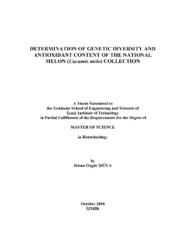Please use this identifier to cite or link to this item:
https://hdl.handle.net/11147/3983Full metadata record
| DC Field | Value | Language |
|---|---|---|
| dc.contributor.advisor | Frary, Anne | - |
| dc.contributor.author | Şığva, Hasan Özgür | - |
| dc.date.accessioned | 2014-07-22T13:52:52Z | - |
| dc.date.available | 2014-07-22T13:52:52Z | - |
| dc.date.issued | 2008 | - |
| dc.identifier.uri | http://hdl.handle.net/11147/3983 | - |
| dc.description | Thesis (Master)--Izmir Institute of Technology, Biotechnology, Izmir, 2008 | en_US |
| dc.description | Includes bibliographical references (leaves: 78-85) | en_US |
| dc.description | Text in English; Abstract: Turkish and English | en_US |
| dc.description | xii, 103 leaves | en_US |
| dc.description.abstract | In this study, characterization with 19 morphological criteria and two types of PCRbased molecular marker systems, Simple Sequence Repeats (SSRs, microsatellites) and Amplified Fragment Length Polymorphisims (AFLPs), were used to characterize genetic variability among 238 national melon (Cucumis melo L.) accessions and 12 different members of the Cucurbitaceae family.According to morphological analysis, all accessions were vigourous. The accessions showed a great variety of fruit shape, 53 (38.4%) accessions were globular (round), 51 (37.0%) were eliptical, 15 (10.9%) were ovate, 7 (5.1%) oblate, 2 (1.4%) elongate and one accession was flattened. Another agronomically important criterion was predominant fruit skin colour. A total of 55 (39.9%) accessions had light yellow predominant skin colour, 34 (24.6%) were pale green, 29 (21.0%) were orange, 9 (6.5%) were cream, 6 (4.4%) were green, 4 (2.9%) were blackish-green and 1 (0.7%) was dark green.In accordance with genetic characterization, a total of 345 polymorphic AFLP fragments (products of 10 AFLP primer combinations) and 93 SSR fragments (products of 12 SSR markers) were detected and used to calculate genetic distance using DICE matrix and UPGMA (Unweighted Pair Group Method) arithmetical averages. The average polymorphic AFLP fragments per combination was 34.5 and SSR fragments per marker was 7.75. The phylogenetic tree showed that groups were clearly separated by both marker systems. This study allowed the identification of the relationship between national melon accessions based on genetic similarity or differences.Forty three melon accessions were also analyzed for total water soluble antioxidant and total phenolic compound activities. | en_US |
| dc.language.iso | en | en_US |
| dc.publisher | Izmir Institute of Technology | en_US |
| dc.rights | info:eu-repo/semantics/openAccess | en_US |
| dc.subject.lcc | QK981.4 S57 2008 | en |
| dc.subject.lcsh | Plant molecular genetics | en |
| dc.subject.lcsh | Muskmelon | en |
| dc.subject.lcsh | Melons | en |
| dc.subject.lcsh | Antioxidants | en |
| dc.title | Determination of Genetic Diversity and Antioxidant Content of the National Melon (cucumis Melo) Collection | en_US |
| dc.type | Master Thesis | en_US |
| dc.institutionauthor | Şığva, Hasan Özgür | - |
| dc.department | Thesis (Master)--İzmir Institute of Technology, Bioengineering | en_US |
| dc.relation.publicationcategory | Tez | en_US |
| dc.identifier.wosquality | N/A | - |
| dc.identifier.scopusquality | N/A | - |
| item.openairecristype | http://purl.org/coar/resource_type/c_18cf | - |
| item.languageiso639-1 | en | - |
| item.openairetype | Master Thesis | - |
| item.grantfulltext | open | - |
| item.fulltext | With Fulltext | - |
| item.cerifentitytype | Publications | - |
| Appears in Collections: | Master Degree / Yüksek Lisans Tezleri | |
Files in This Item:
| File | Description | Size | Format | |
|---|---|---|---|---|
| T000773.pdf | MasterThesis | 7.62 MB | Adobe PDF |  View/Open |
CORE Recommender
Page view(s)
652
checked on Mar 31, 2025
Download(s)
580
checked on Mar 31, 2025
Google ScholarTM
Check
Items in GCRIS Repository are protected by copyright, with all rights reserved, unless otherwise indicated.